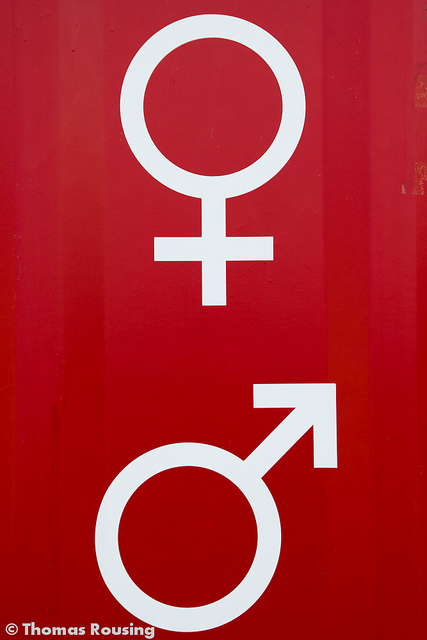In Portuguese all the nomes e pronomes (nous and pronouns) have a gender. They are always either feminine or masculine.

Photo by Thomas Rousing
Even though it might be easy to tell which ones are feminine and which ones are masculine – since femininos usually end in “a” and masculinos in “o” – there are some exceptions which are worth mentioning.
- Cores (colors) – some words for cores will have different endings to them dependendo do gênero (depending on the gender), however, some of them will not change:
Exemplo: Minha blusa é vermelha. – My shirt is red.
Meu carro é vermelho. – My car is red.
In this case the gênero changes for different nouns, since blusa is feminino and carro is masculino. Now take a look at the example below:
Exemplo: Minha blusa é laranja. – My shirt is orange.
Meu carro é laranja. – My car is orange.
In the example above the word laranja remains the same for both gêneros.
Colours that change with gênero:
- Vermelho, vermelha – red
- Amarelo, amarela – yellow
- Branco, branca – White
- Preto, preta – black
- Roxo, roxa – purple
Exceptions:
- Verde – green
- Azul – blue
- Marrom – brown
- Rosa – pink
- Laranja – orange
- Cinza – grey
- Profissão (profession): some professions will have a feminino and a maculino gender, for example:
- o advogado/a advogada – lawyer
- o médico/a médica – doctor
- o garçom/a garçonete – waiter/waitress
- o professor/a professora – teacher
- o governador/a governadora – governor
- o arquiteto/a arquiteta – architect
Exceptions:
- o/a presidente – president
- o/a policial – policeman/woman
- o/a assistente social – social worker
- o/a comerciante – merchant
- o/a gerente – manager
- o/a repórter – reporter
Most professions, however, will fit into two categories: the ones ending in –eiro/–ário and the ones ending in –ista. The rule is simple, if it ends in –eiro/–ário there will be a difference in gender, but if it ends in –ista the word will remain the same for both gêneros.
Ending in –eiro/–ário
- o lixeiro/a lixeira – garbage man/woman
- o carpinteiro/a carpinteira – carpenter
- o banqueiro/a banqueira – banker
- o veterinário/a veterinária – veterinarian
- o porteiro/a porteira – doorman
- o jardineiro/a jardineira – gardener
- o bombeiro/a bombeira – fire-fighter
- o costureiro/a costureira – tailor
- o cozinheiro/a cozinheira – cook
- o açougueiro/a açougueira – butcher
Ending in –ista
- o/a taxista – taxi driver
- o/a jornalista – journalist
- o/a neurologista – neurologist
- o/a pianista – pianist
- o/a dentista – dentist
- o/a recepcionista – receptionist
- o/a cientista – scientist
- o/a economista – economist
- o/a estilista – stylist
- o/a manobrista – valet
There are many other words in Potuguês which are exceptions when it comes to gênero and native speakers don’t usually have a problem knowing if they are feminio or masculino. A good tip for learning these words is to make a note every time you hear something that sounds strange to you and reading them from time to time, as well as trying to use them in conversation.





